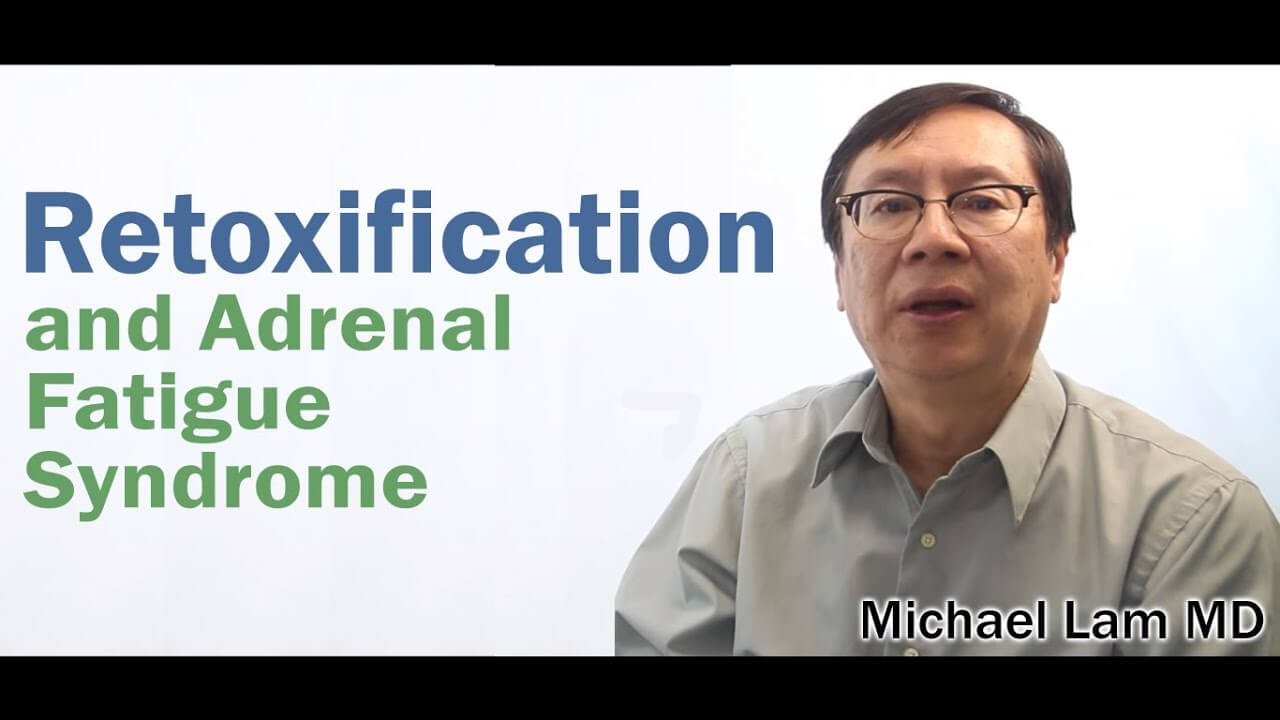
 Retoxification, or retox, is connected to the natural detoxification process of the body. Detoxification is the process of removing toxins from the body. It is a fundamental process of our cells during its respiratory cycle. The most basic form of nutrition and detoxification is breathing. On each complete breath oxygen is consumed as a nutrient. The body then produces carbon dioxide as a waste product which is expelled from the lungs. The body’s detoxification operates round the clock to keep unwanted compounds out.
Retoxification, or retox, is connected to the natural detoxification process of the body. Detoxification is the process of removing toxins from the body. It is a fundamental process of our cells during its respiratory cycle. The most basic form of nutrition and detoxification is breathing. On each complete breath oxygen is consumed as a nutrient. The body then produces carbon dioxide as a waste product which is expelled from the lungs. The body’s detoxification operates round the clock to keep unwanted compounds out.
If the body is overworked, exposed to a large number of toxic elements, or if the body is damaged, as in the case with Adrenal Fatigue Syndrome (AFS), our detoxification process can be affected and become dysfunctional.
Many alternative practitioners advocate a regular program of detoxification as a way to maintain optimum health. Overly aggressive detoxification, however, can create a unique set of unpleasant symptoms, collectively called detoxification reactions. Those who are weak or in advanced stages of AFS suffer from a more severe form of retoxification, or retox.
In alternative medicine, detoxification commonly refers to the removal of heavy metals, xenobiotics, cigarette smoke, medications, alcohol, caffeine, and pollutants from our body. This can be done through enemas, flushes, oral ingestion of certain herbs, intravenous therapy, heat therapy, fasting, and juicing, just to mention a few.
Detoxification is a process largely carried out by our liver where it filters, oxidizes, reduces, and conjugates the metabolite byproducts for excretion out of out body by way of urine, air, sweat, and feces comfortably.
There are two phases of detoxification carried out by the liver cells on contact with toxins. Phase 1 liver detoxification is carried out by fifty liver enzymes known as the cytochrome P450 enzyme system. Glutathione is also produced, which is then used during Phase 2 of the liver detoxification. It is during the Phase 2 detoxification that special processes such as methylation, glutathione conjugation, and sulfation take place. These two phases, though basically dissimilar, are complementary biochemically and facilitate the body processes which keep it clean at all times in order for us to feel good. If the glutathione level is low or if the liver’s P450 pathways are compromised or imbalanced, dysfunction will surface. Because the liver is a rather large organ with a large reserve capacity, one may not detect any dysfunction until the damage is well entrenched even when laboratory tests are still normal because they are not sensitive enough to detect early damages. One can also be in a subclinical state of liver dysfunction and be symptomatic and have routine liver laboratory testing be normal.
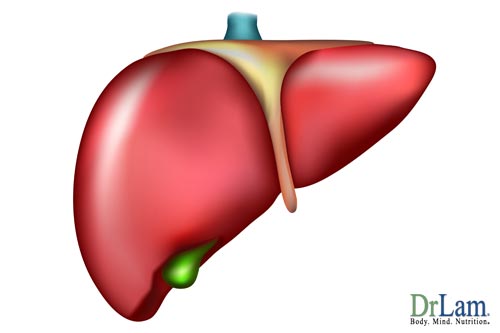 Generally, the actions of the enzymes during Phase 1 detoxification reduces the chemical toxicity of pollutants. Phase 2 is needed because some of the post Phase 1 metabolic byproduct compounds can be more toxic than the original compound. This phenomenon is called bioactivation. It is with the Phase 2 detoxification process that such chemicals are turned into harmless compounds and eliminated from the body. Any dysfunction or imbalance in Phase 1 and Phase 2 detoxification will lead to improper detoxification, resulting in increased toxin load within the body, triggering symptoms of endocrine, nervous system, immune, and other organ toxicities.
Generally, the actions of the enzymes during Phase 1 detoxification reduces the chemical toxicity of pollutants. Phase 2 is needed because some of the post Phase 1 metabolic byproduct compounds can be more toxic than the original compound. This phenomenon is called bioactivation. It is with the Phase 2 detoxification process that such chemicals are turned into harmless compounds and eliminated from the body. Any dysfunction or imbalance in Phase 1 and Phase 2 detoxification will lead to improper detoxification, resulting in increased toxin load within the body, triggering symptoms of endocrine, nervous system, immune, and other organ toxicities.
Bioactivation is a key concept to understand as its presence indicates increased toxic load and is a contributing factor of a more severe form of detoxification reaction called retox reaction.
Problems also arise when a normal liver has reached its maximum metabolic workload when stressed. Examples of stressors can include toxic chemical fumes, infection, or medications. If stressors are not removed the liver can start decompensating. This occurs during advanced stages of AFS. Unprocessed toxins waiting for breakdown may accumulate as a result and partially metabolize and a bio-activated toxic load buildup causes havoc within our body.
Remember that the body is constantly undergoing a detoxification process. Only when there is a sudden imbalance in this process will a detoxification reaction be triggered. Three common triggers are:
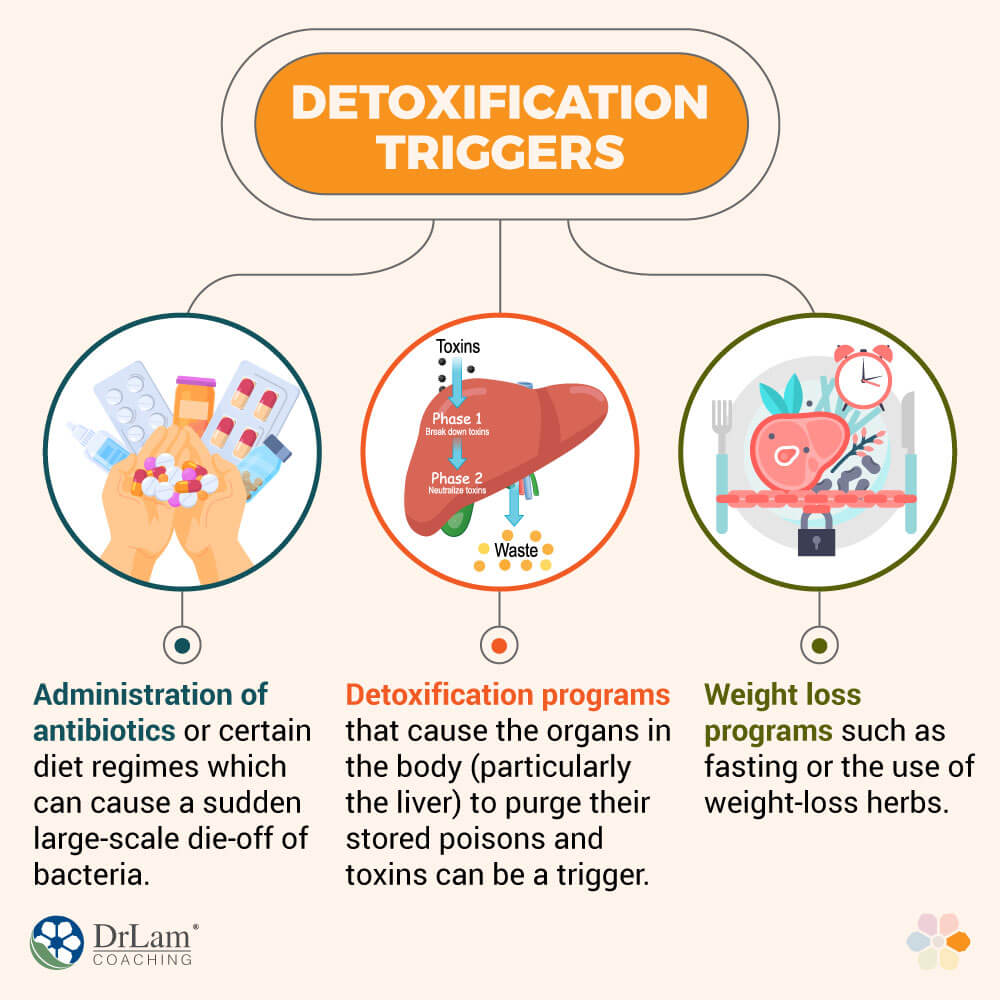
Detoxification reactions also go by different names including healing reactions, healing crises, die-off, cleansing reactions, or Herxheimer reactions.
As mentioned above, the normal detoxification process is automated by the body and works continuously without us knowing. If aggressive detoxification modalities are administered and the body is not ready, there may be a sudden surge of toxic metabolic load in the body. In a normal healthy person, the body rebalances itself automatically by increasing its excretion mechanism to help get rid of toxin overload. No symptoms are felt.
 Sometimes you may hear of healthy people feeling drained or exhausted after a hot yoga or sauna session, or after taking part in a liver cleanse, enema, or fasting protocol. It may take them anywhere from a few hours to a day or two to regain their composure. This is an early warning sign that the body’s detoxification process may be reaching its maximum workload. More rest is needed and the body will usually return fully to baseline function within a few days.
Sometimes you may hear of healthy people feeling drained or exhausted after a hot yoga or sauna session, or after taking part in a liver cleanse, enema, or fasting protocol. It may take them anywhere from a few hours to a day or two to regain their composure. This is an early warning sign that the body’s detoxification process may be reaching its maximum workload. More rest is needed and the body will usually return fully to baseline function within a few days.
Those who are weak, or in early stages of AFS, fare worse as the body’s detoxification process is strained. A full-fledged detoxification reaction may occur, with symptoms that include fatigue, brain fog, anxiety, skin eruptions, diarrhea, bloating, stomach cramps, joint pain, low-grade fever, gastric discomfort, and headache. These generally resolve over time, but it can take upwards of one to two weeks. The first one to two days may be incapacitating.
The term retoxification, or retox, is generally used in the general public when a person resumes the consumption of alcohol, caffeine or other addictive substances after undergoing detoxification for those who are healthy. In the case of Adrenal Fatigue Syndrome, it refers to the body becoming retoxified as it is undergoing the normal automated detoxification process mentioned previously. In other words, additional insults above and beyond that of the normal detoxification process are levied on the body.
Retox reaction is a more severe form of detoxification reaction. A retox reaction is seldom experienced by normal healthy people or those in mild or early stages of AFS because the body possesses adequate reserves to compensate and adjust for the increased toxic load automatically. This, however, is a common occurrence for those in advanced stages of AFS or who are chronically ill and weak.
For example, a sauna or hot yoga is a good detoxification modality, which uses heat. With heat, the blood vessels tend to dilate and toxins are released in the form of sweat. Normal people feel relaxed during sauna, invigorated afterward, and come away energized. Those in early stages of AFS don’t do quite as well. The toxic load within increases and improper or slowed speed of toxic clearance from the body may lead to a brief period of mild fatigue, headache, and lethargy. This detoxification reaction is usually self-limiting. After a few hours of rest, the body regains its posture and energy fully returns.
The same cannot be said for those in advanced stages of AFS (stages 3 and 4). For these individuals, even a few minutes within a sauna or under direct sunlight may be too much. Most are unaware of the damage within until they either stay too long or after the session is over. They experience what is called a retoxification reaction.  Instead of feeling good the heart rate goes up and continues to stay up for hours. Headaches, fatigue, and lethargy can last for days. Insomnia and hypoglycemia may be triggered that can go on for weeks or even months. In severe cases, one could be incapacitated.
Instead of feeling good the heart rate goes up and continues to stay up for hours. Headaches, fatigue, and lethargy can last for days. Insomnia and hypoglycemia may be triggered that can go on for weeks or even months. In severe cases, one could be incapacitated.
A retoxification reaction, therefore, may be considered a severe form of detoxification reaction afflicting primarily those who are weak. Both are part of the toxic continuum but have important distinctions.
The term retoxification reaction denotes the underlying pathophysiology process of a body under multiple insults and repeated damage from toxin overload. In addition to the increased release of normal metabolic byproducts during a detoxification process, the body is further damaged by the onslaught of highly toxic bio-activation of partially metabolized components not properly funneled to the next level of the normal detoxification process for neutralization. On top of that, there is usually significant congestion at the extracellular matrix that leads to retarded recovery.
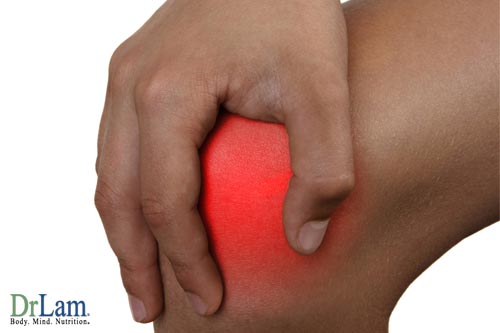 In addition to common characteristics of detoxification reaction mentioned previously, signs and symptoms of retoxification reaction include:
In addition to common characteristics of detoxification reaction mentioned previously, signs and symptoms of retoxification reaction include:
The key differentiation clinically between detoxification and retoxification reaction lies in the overall severity of pathology underneath and thus the recovery time. Retoxification reaction is more severe, lasts longer, and is harder to recover. Even with rest and nutritional support, full recovery cannot be attained. Instead, there are frequent recurrences.
The clinical picture is clear from afar. The body is fragile and weak to start. It is unable to fully neutralize and metabolize toxins within. A residual load of toxins is ever-present internally and continually needs to be cleaned up. It’s a chronic problem rather than a one-off. The body is tired. As the toxic load builds up symptoms surface from time to time. Triggers can be something as simple as ingesting cold water, watching an action movie, exposure to direct sunlight, taking a hot water bath, drinking a sugary drink, emotional stress, or overexertion. Many describe this as similar to a mini adrenal crash. Because there are no laboratory tests to diagnose this, a detailed history by an experienced clinician is needed to ascertain its presence.
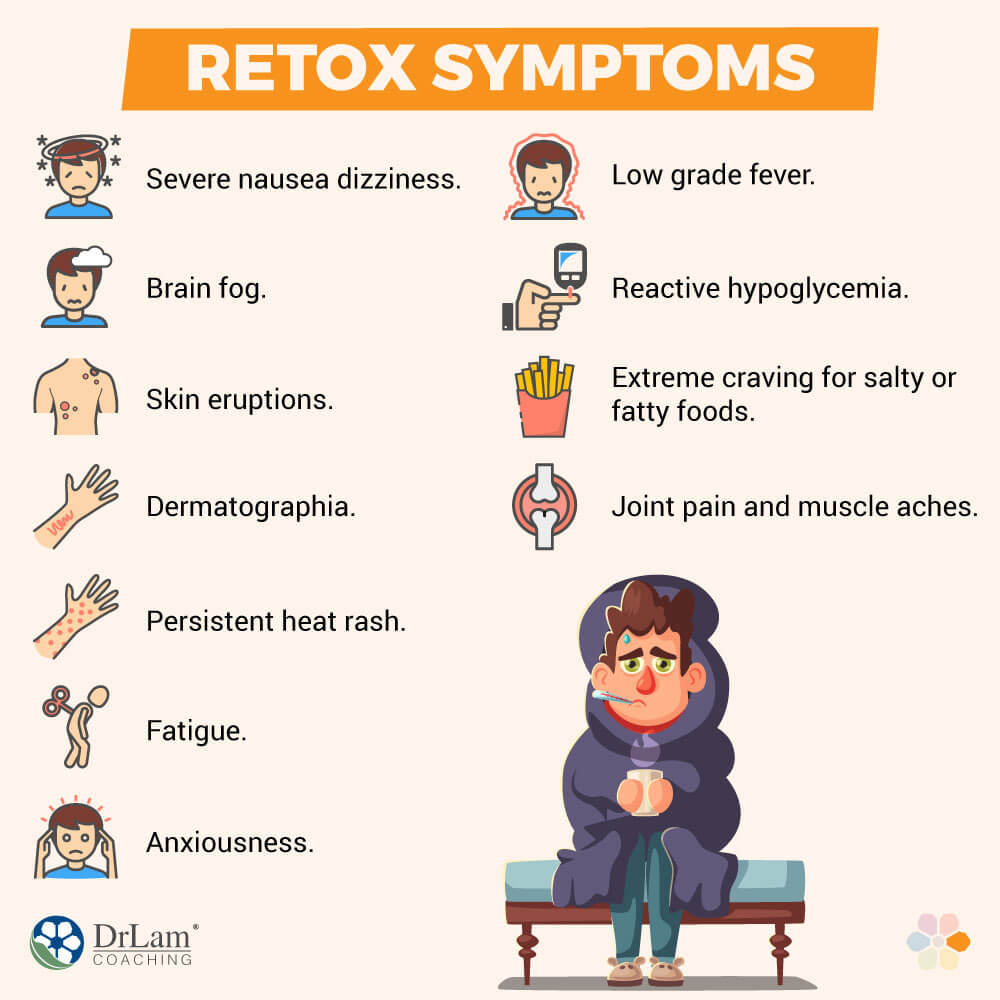
Extracellular Matrix (ECM) is the non-living universe outside the cells. It is an intricate system of fluid, fiber, and collagen forming the scaffolding for the body’s organs to work and communicate within. It is the highway between the organs in addition to the circulatory and nervous system. It connects the entire body, from head to toe. The degree of ECM congestion is a key determining factor in deciding whether one is suffering from detoxification or retoxification reaction.
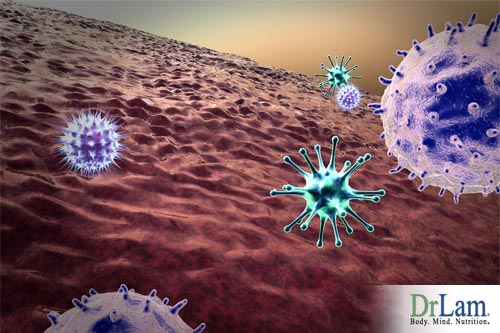 The ECM also acts as an alternative sewage storage and transport facility of the body. Any congestion of the ECM will spell trouble. Unfortunately, the role of ECM is seldom investigated. Mass release of intracellular toxins as cells and cell walls disintegrate, for example, leading to an increased release of toxins to the ECM outside the cell for storage, transportation and excretion. This increase in ECM toxic load causes breakdown of ECM structural constituents, increasing pollutants and debris in the ECM. Problems arise if the ECM becomes overwhelmed, stagnated, and effectively incapacitated by the unusually large quantities of toxicity being released by the cells. A congested ECM puts undue pressure on the remaining pathways, causing a domino effect.
The ECM also acts as an alternative sewage storage and transport facility of the body. Any congestion of the ECM will spell trouble. Unfortunately, the role of ECM is seldom investigated. Mass release of intracellular toxins as cells and cell walls disintegrate, for example, leading to an increased release of toxins to the ECM outside the cell for storage, transportation and excretion. This increase in ECM toxic load causes breakdown of ECM structural constituents, increasing pollutants and debris in the ECM. Problems arise if the ECM becomes overwhelmed, stagnated, and effectively incapacitated by the unusually large quantities of toxicity being released by the cells. A congested ECM puts undue pressure on the remaining pathways, causing a domino effect.
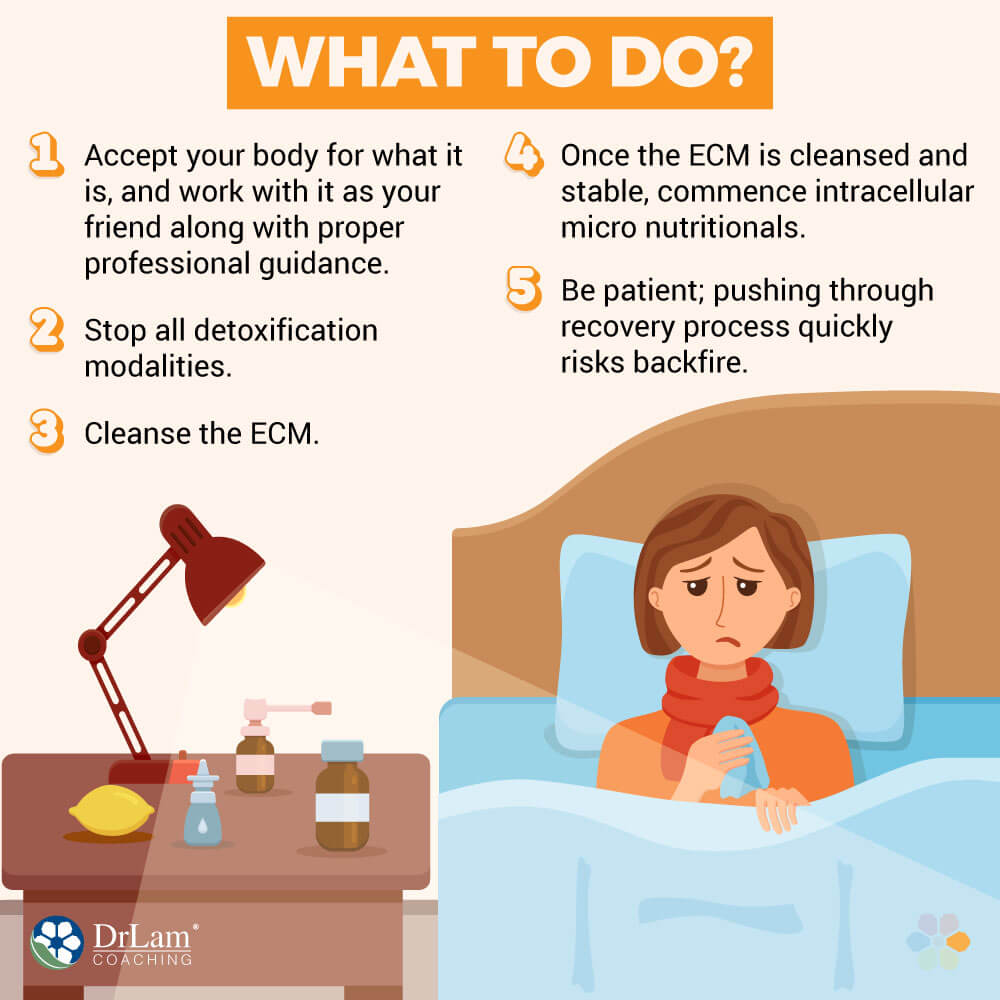
ECM damage and congestion is perhaps the main and most critical contributing factor to why retoxification reaction classically presents itself with symptoms similar to detoxification reaction. However, retoxification reaction lingers on for a longer period without full recovery and attempts to use micronutrients to support retoxification reaction usually backfire while the same use in detoxification reaction yields positive results.
If you are experiencing negative reactions from detox, make the distinction of whether you are suffering from a detoxification or a retoxification reaction. Most detoxification reactions are mild and self-limiting once the detoxification approaches are stopped, whether it be fasting, sauna, or liver flushes. Uses of additional nutrients may be indicated to help facilitate the recovery process. The body is usually stable and strong enough.
This is quite different from those who suffer from retoxification reaction, as they are usually much less stable and weak. Symptoms can linger for a long time, and recovery is usually retarded and suboptimal. Most are at increased risk of adrenal crashes if not timely reversed. The more retoxification reaction is experienced, the weaker the body becomes and the harder is the overall recovery from Adrenal Fatigue Syndrome (AFS). Preventing this unstable vicious cycle from being entrenched is critical. It has to be an integral part in the overall planning of a comprehensive approach to AFS recovery.
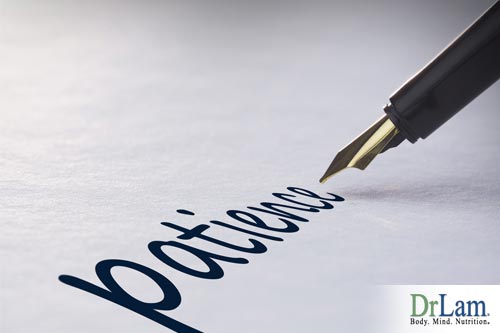 As compared to a detoxification reaction where rest will normally suffice a full recovery, a comprehensive mind-body-neuroendocrine approach is needed here, especially for those with a history of repeated retoxification reaction. Aside from stopping all detoxification modalities, the key in turning the corner lies first with cleansing the ECM. That may take weeks to months. A lot of patience is required. One cannot push through this process quickly without risking backfire. A micro-nutritional regimen may need to take a back seat temporarily and allow for adjustment accordingly. Some support may be needed, but it must be carefully matched with the state of the body’s clearance capacity at every point in time.
As compared to a detoxification reaction where rest will normally suffice a full recovery, a comprehensive mind-body-neuroendocrine approach is needed here, especially for those with a history of repeated retoxification reaction. Aside from stopping all detoxification modalities, the key in turning the corner lies first with cleansing the ECM. That may take weeks to months. A lot of patience is required. One cannot push through this process quickly without risking backfire. A micro-nutritional regimen may need to take a back seat temporarily and allow for adjustment accordingly. Some support may be needed, but it must be carefully matched with the state of the body’s clearance capacity at every point in time.
Once the ECM is cleansed and stable, one can consider to gently commence intracellular micro nutritionals using the right delivery system for the organ concerned, taking care to dose properly for the stage of AFS in an attempt to bring micronutrients into the cell to prime the pump, as they say.
The cleansing of ECM and transition back to micronutrient support are challenging because the body may not cooperate. Hypersensitivity and negative paradoxical reactions are common. Allot plenty of time for a slow and systematic recovery from this fragile state when retoxification is at risk.
Any attempt to short cut the process by using potent medications or nutrients that had worked well previously is risky and can backfire.
Our mental health can affect recovery speed. Negative thoughts originating in the brain can negatively impact our hormonal output and internal balance. The mere emotional state of frustration and impatience can generate a negative energy field, which further congests the ECM. Accept your body for what it is, and work with it as your friend along with proper professional guidance. The body’s recovery can only go as fast as the level of cellular toxic secretion from within the cell’s respiration process matched by the speed of flow within the ECM that carries the toxins away for eventual excretion. Once the intracellular function is primed, the small but solid snowball can then start rolling on its own, and the speed of recovery can accelerate.
Everybody’s recovery speed and timeframe is different. Some trial and error is required even in the best of hands. Clinical experience is key, which is why most people who try to self-navigate through multiple retoxification reactions with a weak body usually fail to recover successfully from AFS but instead get worse over time.
Benefits: The coffee enema increases bile flow and removes toxins in the large intestine so they will not be absorbed. Dangers: Fatigue, headache, and stomach ache are symptoms of a coffee enema because the body can not rid the toxins quick enough.
Toxins represent a drain on the body as the anti-inflammatory response takes energy to work. Toxins inside the cells are very damaging to the mitochondrial, RNA and DNA.
It could be both, and the situation varies from person to person.
Toxins represent a drain on the body as the anti-inflammatory response takes energy to work. Toxins inside the cells are very damaging to the mitochondrial, RNA and DNA.
"Thanks for all your support and teaching along the way"
" Hello, Dorine.
Just wanted to check in and update you on my progress and my situation. I'm still using certain AFS supplements from Supplement Clinic, along with other supplements that work for me. As always, thanks for all your support and teaching along the way. It continues to serve me every day."